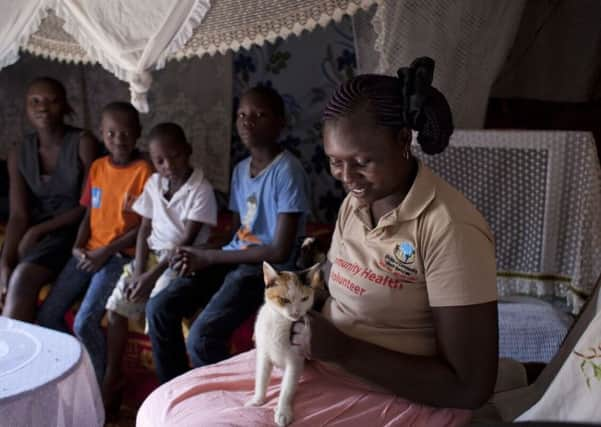Where HIV is better than cancer and children die of hunger


The little they have is one thing, but their health also seems to be constantly on the line.
Suffering from severe malnutrition, HIV, cancer and even obesity and diabetes, the poorest of Nairobi’s poor have no access to free public health services their wealthier neighbours do.
Advertisement
Hide AdAdvertisement
Hide AdBecause they live in informal settlements, the government won’t recognise, public services like schools and health centres are not provided - despite slums housing 60 per cent of the city’s population.
This means that in the slums we visited - Korogocho and Dandara - the only option for most is private clinics that are both unregulated and must be paid for.
But Concern Worldwide has established a network of 450 community health volunteers to promote maternal, neonatal and child health. Through its Community Health Volunteer (CHV) scheme, the charity trains slum residents - at a cost of £18 each - to provide help and advice on a range of health issues.
The harsh reality is that this also includes starving children.
Advertisement
Hide AdAdvertisement
Hide AdUnable to stand, and with every bone in her tiny body visible, we met 18-month-old Shallet, who wasn’t far from the brink of death.
Dehydrated, her skin crinkled like paper, her eyes were sunk into her little head and her hair had lost its colour because of severe malnutrition.
But her condition was not the only thing on her young mother’s mind, as Caroline’s 12-year-old son also had a severely infected leg, while her three-year-old was coughing badly.
We followed CHV Janet, who had dreams of being a nurse before her father forced her to marry as a teenager.
Advertisement
Hide AdAdvertisement
Hide AdA widowed mother of six herself, Janet nursed her husband, before losing him to colon cancer.
She told us that getting cancer in Korogocho is like a death sentence, but in comparison “HIV is a friendly disease provided you take your medicine”.
“We do not have money to treat cancer, ” she said. “It is 10,000sh (£80) for radiotherapy a week.”
Despite battling difficult circumstances herself, Janet now gives up her free time to help babies like Shallett.
Advertisement
Hide AdAdvertisement
Hide AdWith Concern’s support, she monitors 100 families in her slum, and has been working with Shallett’s mother Caroline to try and save her.
But she said their situation is not unusual in Korogocho, where “so many people are suffering”.
Coming from a similar situation herself, Janet said the advice she received when her daughter was ill with malnutrition inspired her to help others.
“Many mothers are ignorant about how to care for their children, ” she explained. “Poverty puts these mothers in bad situations. They want to try and do it (but) instead of taking these children to school, they go to search for food and leave them indoors.
Advertisement
Hide AdAdvertisement
Hide Ad“Lack of family planning can also bring these things. We refer mothers that are having a lot of children, for family planning.”
But a doctor at the nearby clinic, said this doesn’t always work out, as men are very much in control and do refuse such measures.
“We also give them advice, how to cook food, and avoid things like bad hygiene that make children ill, ” Janet went on.
“If I go into the field and find a child with red on MUAC (middle upper arm circumference) I will refer them.”
Advertisement
Hide AdAdvertisement
Hide AdThis means that children in the danger zone are put on a food plan, to bring them back to a healthy weight.
On Janet’s rounds, we also met little Michelle, who with Janet’s intervention has survived. But, she said without ongoing support, it would not take long for Michelle to be back at square one.
Her mum Agnes, alone at home with other children to feed, said they are also close to being evicted from home. “Poverty brings a lot of problems in our community, ” said Janet.
And Concern staff agreed.
“Major public health centres, you will find are just outside the slums - servicing settled populations, ” said Andy Fox, Concern’s Programme Director in Kenya.
Advertisement
Hide AdAdvertisement
Hide Ad“So, a number of them access that, but the population is so big that actually most of the primary health care is provided by private clinics, which are unregulated and they have to pay. There are free maternity services, but if you can access it.”
The silver lining is that without Concern’s support, the families that Janet, and others like her help, would otherwise be forgotten.